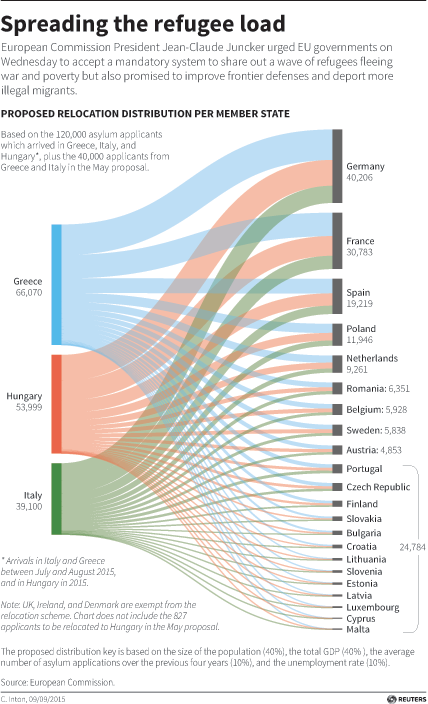Have we reached a tipping point in the refugee crisis?
Stay up to date:
Humanitarian Action
It’s important to place Europe’s current refugee crisis in perspective. This is not the first time that Europe has been confronted by very large numbers of refugees; over one million people fled the Balkans during the 1990s and arrived in significant numbers in every EU country. The arrival of one million refugees today will not overwhelm the EU, the world’s largest economy with a population of over 500 million people. Outside Europe, Turkey, Jordan and Lebanon are all coping with far more Syrian refugees than Europe.
Nevertheless, the response that is emerging in Europe is dramatically new, and may be irreversible. This feels like a tipping point.
First, Syrian refugees are voting with their feet – and the result is a vote of no confidence in the international refugee regime. They are unable and unwilling to stay in Syria, and to become the victims of inaction by the international community. By all accounts they are grateful for their reception in neighbouring states, but do not see a long term future there. They are paying smugglers and risking their lives to get to Europe, whatever obstacles are put in their way. They have overturned the ad hoc, short-term, and inconsistent policies on which the international community has relied for far too long. They have literally scaled the walls of Fortress Europe.
Second, European people have begun to fill the vacuum left by their governments by displaying solidarity and support to the refugees, often in direct contravention of national law. At last the silent majority is finding its voice against the vocal minority of xenophobes in Europe. And the people are standing up to their politicians, who for too long have used the fear of a public backlash as an excuse not to be proactive on migration and refugees.
Third, championed by Angela Merkel, European states are resettling refugees. While the US, Canada, and Australia have between them resettled hundreds of thousands of refugees each year for the past few decades, Europe has resettled virtually none. Resettlement is not a silver bullet: it is selective, it cannot occur on a scale significant enough to meet demand, and it will not stop migrants and refugees arriving without authorization. But it is a critical part of a comprehensive response for refugees. And as Mrs Merkel fully appreciates, it is not just a humanitarian response, but also a way to plug demographic gaps and secure economic prosperity in the future.
Tipping points are risky. European governments may wait it out – history shows that asylum seeking ebbs and flows and there’s a good chance that we can do nothing at all and the numbers will have declined by next year. The groundswell of popular support may deflate once the realities of integration challenges become clear. The fairly lamentable resettlement quotas currently being announced by a handful of EU states may mean that Germany will have to go it alone.
But let us hope that this tipping point is real. From this crisis comes an opportunity to review and reform the international refugee regime; to promote an objective debate on migration and asylum; and to fulfill Europe’s historical legacy for tolerance. In my opinion it should also be the opportunity to nominate Mrs Merkel for the Nobel Peace Prize.
Have you read?
These reforms will help Germany support its new citizens
Why we need a global response to the refugee crisis
Author: Khalid Koser is Executive Director, Global Community Engagement and Resilience Fund (GCERF), Switzerland. Member of the World Economic Forum Global Agenda Council on Migration
Image: Refugees and migrants arrive on a dinghy on a beach full of life jackets, deflated dinghies and life tubes left behind, on the Greek island of Lesbos, September 10, 2015. REUTERS/Dimitris Michalakis
Don't miss any update on this topic
Create a free account and access your personalized content collection with our latest publications and analyses.
License and Republishing
World Economic Forum articles may be republished in accordance with the Creative Commons Attribution-NonCommercial-NoDerivatives 4.0 International Public License, and in accordance with our Terms of Use.
The views expressed in this article are those of the author alone and not the World Economic Forum.
Related topics:
Forum Stories newsletter
Bringing you weekly curated insights and analysis on the global issues that matter.
More on Geographies in DepthSee all
Kaiser Kuo
June 24, 2025
Kaiser Kuo
June 19, 2025
Aimée Dushime
April 18, 2025
Samir Saran and Anirban Sarma
April 17, 2025
Nada AlSaeed
April 16, 2025
Zhang Xun and Vee Li
April 8, 2025






